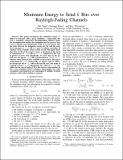Minimum Energy to Send $k$ Bits Over Multiple-Antenna Fading Channels
Author(s)
Polyanskiy, Yury
DownloadAccepted version (354.5Kb)
Terms of use
Metadata
Show full item recordAbstract
This paper investigates the minimum energy required to transmit k information bits with a given reliability over a multiple-antenna Rayleigh block-fading channel, with and without channel state information (CSI) at the receiver. No feedback is assumed. It is well known that the ratio between the minimum energy per bit and the noise level converges to 1:59 dB as k goes to infinity, regardless of whether CSI is available at the receiver or not. This paper shows that lack of CSI at the receiver causes a slowdown in the speed of convergence to -1:59 dB as k → ∞ compared to the case of perfect receiver CSI. Specifically, we show that, in the no-CSI case, the gap to -1:59 dB is proportional to ((log k)/k)1/3, whereas when perfect CSI is available at the receiver, this gap is proportional to 1/√k. In both cases, the gap to -1:59 dB is independent of the number of transmit antennas and of the channel's coherence time. Numerically, we observe that, when the receiver is equipped with a single antenna, to achieve an energy per bit of -1:5 dB in the no-CSI case, one needs to transmit at least 7×107 information bits, whereas 6 × 104 bits suffice for the case of perfect CSI at the receiver (same number of bits as for nonfading AWGN channels). Interestingly, all results (asymptotic and numerical) are unchanged if multiple transmit antennas and/or block fading is assumed.
Date issued
2015-06Department
Massachusetts Institute of Technology. Department of Electrical Engineering and Computer ScienceJournal
2015 IEEE International Symposium on Information Theory (ISIT)
Publisher
Institute of Electrical and Electronics Engineers (IEEE)
Citation
Yang, Wei, Giuseppe Durisi and Yury Polyanskiy. "Minimum energy to send k bits over Rayleigh-fading channels." 2015 IEEE International Symposium on Information Theory (ISIT), Hong Kong, China, 14-19 June 2015.
Version: Author's final manuscript
ISSN
0018-9448
1557-9654